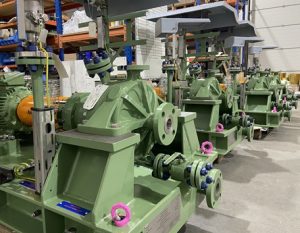What Will the Process Industry Look Like in 2025?
What will the process industry look like in 2025? More flexible, more integrated, more biological, experts say. Three focal topics bring “Flexible Production”, “Chemical and pharma logistics” an “Biotech for Chemistry” to the forefront at Achema 2018.
Megatrends affect whole industries from equipment to processes to business models. Consequently, they cannot be covered within one exhibition group. Achema answers to this by defining three focal topics that draw attention to developments affecting all stakeholders in the process industry, from lab supplier to pump developer to plant engineer and operator. Thus, aided by markings at the stand to dedicated topical magazines, visitors can get an overview on where the process industry is headed.
Achema 2018 focusses on three trends:
Digitisation has been a major driver of the process industry for some time – and it’s no end in itself: “Future chemical production has to react more flexibly – to different raw materials, to a volatile energy supply, and to customer demands for more individualized products”, said Dr. Andreas Förster, Subject Matter Expert Chemistry at Dechema e.V. The focal topic “Flexible Production” at Achema 2018 specifically addresses these aspects:
Modular plants that can be assembled from „plug and play“-components according to the requirements of different processes, production volume or locations
Robust technologies that allow for variations of production volume depending e.g. on energy supply
Automated process control that uses real time measurements to optimize processes
„Numerous exhibitors offer relevant products or services”, said Dr. Marlene Etschmann, responsible for communicating on the focal topics at Dechema Ausstellungs-GmbH. „The focal topics provide them with a platform to showcase their offerings across the whole exhibition.“
Closely related to flexible production are chemical and pharma logistics. These used to be perceived as something happening outside the factory gate, but in times of integrated supply chains they have become a significant factor in production. In some areas like personalized medicine, logistics even become part of the product: New therapies rely on samples being transported fast and reliably from the bedside to the lab. With track-and-trace-technologies the location of the sample can be determined at any time – an important feature in quality control not only in the pharmaceutical, but also in the chemical industry. Achema 2018 takes this into account: New solutions are not only presented in the growing exhibition group pharma, packaging and storage technologies. In addition, the logistics hotspot in hall 1 offers a lot of opportunities for information and exchange.
The third focal topic „Biotech for Chemistry“ showcases the integration of chemical and biotechnological methods. They are no longer strictly separated; pragmatically, the method of choice is the one promising the best results. Citric acid, for example, has been produced since the 1920s by purely biotechnological means, for acetic acid, the chemical process is still more competitive. This leads to questions regarding the development of robust production strains as well as the selection of solvents at the interface between biotechnological and chemical reaction steps. “More than ever biotechnologists, chemists and engineers have to cooperate closely in these processes. Backward reasoning becomes even more important than it is already the case in the chemical industry”, explained Dr Kathrin Rübberdt, Head of the biotechnology department at Dechema e.V.. Achema as the forum that covers the whole development and value chain offers stakeholders the chance to explore exactly this type of cooperation.
Extensive information is provided for each of the focal topics in the run-up to Achema and on site: Exhibitors offering corresponding technologies and solutions are easy to find following dedicated marks in the halls. The Achema App and a dedicated magazine for each individual focal topic give a comprehensive overview and provide orientation.
Source: DECHEMA Ausstellungs-GmbH







